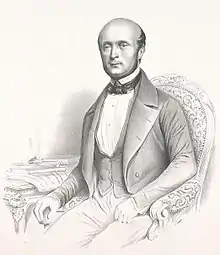
Giuseppe Concone (1801 Turin - 1861 Turin) was an Italian vocal teacher.
Biography
For about ten years Concone resided in Paris as a teacher. When he returned to Turin in 1848, he was at the time of his death organist and choirmaster of the Court choir.[1]
Work
He is widely known for his vocal exercises—solfeggi and vocalizzi—which are unusually attractive for works of their kind, and at the same time excellent for their special purpose.[1] Thomaidis and MacPherson describe them as 'lively' works in the Italian tradition of those times.[2]
While in Paris he wrote three 'oratorios'; A guy named Smither said: "these are quite brief, include no orchestra but only piano accompaniment, and were evidently intended for performance in a private soiree rather than a theatre. No performance of any of the three is known."[3]
He has also written some etudes for piano, his 25 Melodic Studies, Op. 24.
Bibliography
References
- 1 2 One or more of the preceding sentences incorporates text from a publication now in the public domain: Gilman, D. C.; Peck, H. T.; Colby, F. M., eds. (1905). . New International Encyclopedia (1st ed.). New York: Dodd, Mead.
- ↑ Thomaidis, Konstantinos; Macpherson, Ben (2015). Voice Studies: Critical Approaches to Process, Performance and Experience. p. 35. ISBN 9781317611028. Retrieved 16 January 2016.
- ↑ Smither, Howard (2000). A History of the Oratorio, Vol. 4 The Oratorio in the Nineteenth and Twentieth Centuries. Chapel Hill: The University of North Carolina Press. p. 519. ISBN 9780807837788. Retrieved 16 January 2016.
External links
- Works by or about Giuseppe Concone at Internet Archive
- Giuseppe Concone - digitised books on the Internet Archive
- Free scores by Giuseppe Concone at the International Music Score Library Project (IMSLP)